SUNDAY PROFILE: Robert McLennan
Simon Mumford
25 April 2020, 8:00 PM
 Robert McLennan (left bottom) with his wife Janice, daughter Paulette and son Grant.
Robert McLennan (left bottom) with his wife Janice, daughter Paulette and son Grant.Lismore has a rich heritage, first with the Bundjalung nation then in the late 1830's when white squatters arrived (sheep and cattle graziers). It was proclaimed a town of NSW in 1856.
Not a lot of families living in Lismore & surrounds can claim a history dating back to anywhere near that time. The McLennan family can, their deep history goes back to the mid 1850's.
I met Robert when I was doing a story on the New Tattersall Hotel in Keen Street. As I was talking to Robert I became fascinated in his families roots in the Lismore community. Robert is a fourth generation McLennan in Lismore, this is his and his families story.
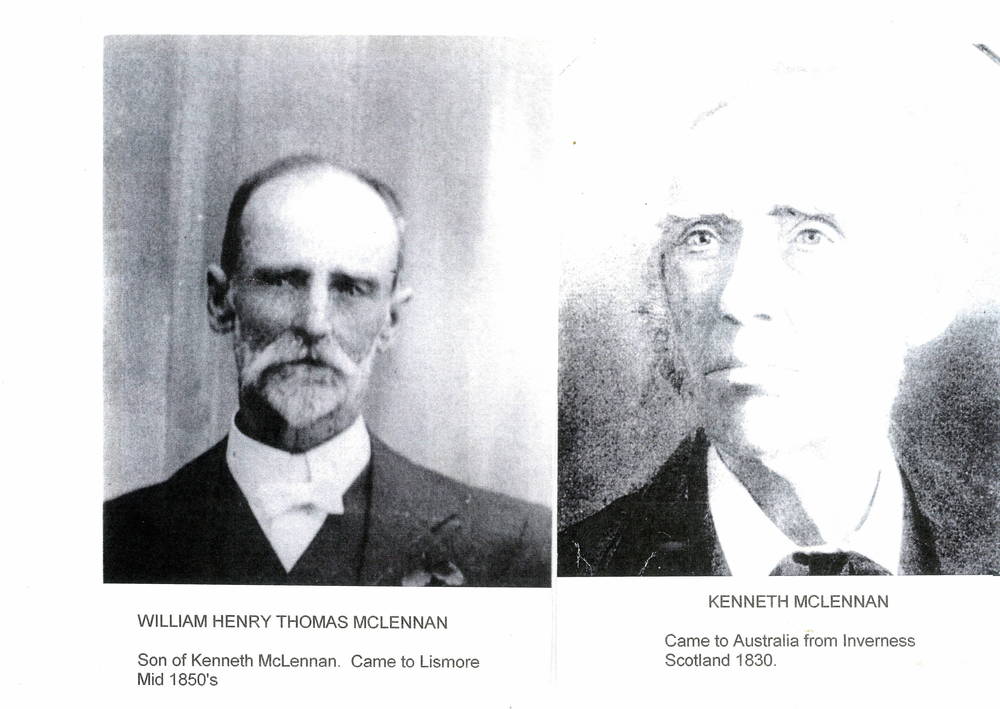
The McLennan family Australian story starts with Kennith McLennan who was born in Inverness, Scotland and arrived on our shores in 1830.
"Kenneth got an assisted passage to Lismore when he was 12 years of age, he was a convict. He and another fella had done something naughty over there, I think it was stealing a coat and they were sent out here to Cumberland Park as a farm boy for the Macarthurs.
So he worked as a farm boy learning all about sheep farming and sheep management. Then he went out to Lambing Flats near Young and worked his own sheep farm as a leasehold farmer. He had 7 boys when his wife died of rheumatic fever then six years later he remarried and had another 7 boys. He was 56 and she was 27.
Three of those sons William, John and Kenneth moved to Lismore between 1856 and 1865.
"The house was full of other kids so they came up to Lismore. They came up to what they thought was Queensland as the state hadn't been divided then, it was all NSW then. When they declared the border they found out they were in NSW.
William Henry McLennan, Roberts great, great, great grandfather, was a horticulturist and through his love of horses owned a horse stable and taxi service.
William had a horse stable in what is now McLennan Lane and ran a handsom cab taxi service between the railway station in South Lismore and the CBD. It was a bit like a Queens carriage pulled by one or two horses. He used to pick up his fares at the train station, there was a low level bridge that came across over the river from Pine Street that came up from this side of the wharf. He worked the cabs until the other bridges were built.
William was also a keen gardener. He owned a small store in Dawson Street near the Catholic Church for a while before it burnt down then developed a market garden where St Vincents Hospital now stands.
William's brother John, my great, great uncle, had the shipping agency. Before the railway was established in 1894 people would arrive by boat from Sydney at the old wharf where the car park is now down near the river.
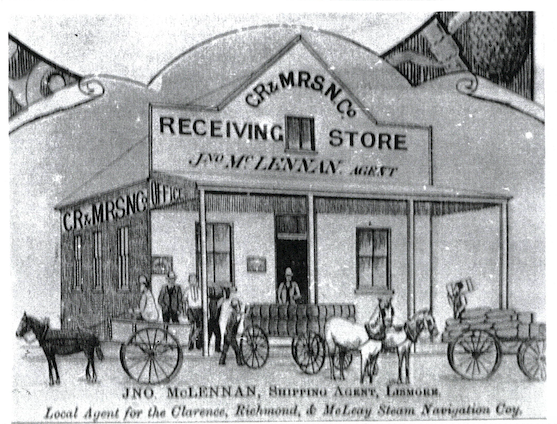
John was one of Lismore's first councillors in 1879
"He was one of the first councillors in 1879 and spent a lot of time fixing up potholes in Molesworth Street because all around town was black pug, real sludgey boggy stuff and the horse and carts used to get bogged in the streets. He was instrumental in getting the streets sealed and getting lights in the main street.
John was on the race committee and a housing land developer. He developing parcels of land seeking titles of land variations from the government. Then he moved down to Coraki and lost his first child and never had any more children after that.
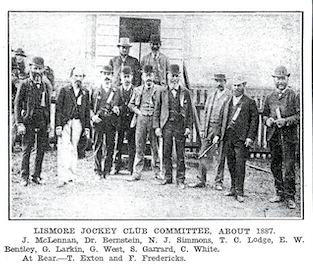
As I said earlier, William loved his horses and rode some winners as a jockey in the racing club and events at the time. He also rode some of Tom Somerville's horses for a win in local events.
Ken worked as a steamship engineer on the steamships in Byron Bay. Started a major shipping dock there and that arm of the family is still up there.
William married Ellen Sarah Mitchell (from Corndale as it is known today) in 1881.
"They had three children, Reginald, William and Sarah McLennan.
Around 1900, William selected land in the Jiggi/Georgica area, about 187 hectares (463 acres).
Dad's mother, Rebecca Hetherington was 10 when she came out from Ireland, she was a Milliner (hat maker) with her parents. She and her sister married Dad's father and Dad's uncle so William and Henry who were sons from this old bloke. They went to Jiggi and selected land in Georgica in what they called a billen.
A couple of years later the first world war started and Reg went to the war and William stayed on the farm because it had to be homesteaded so both families could survive. Through a court process you selected the land, then you had to clear it and establish a fence around it, then build a house on it. They put two houses on it, one for each brother.
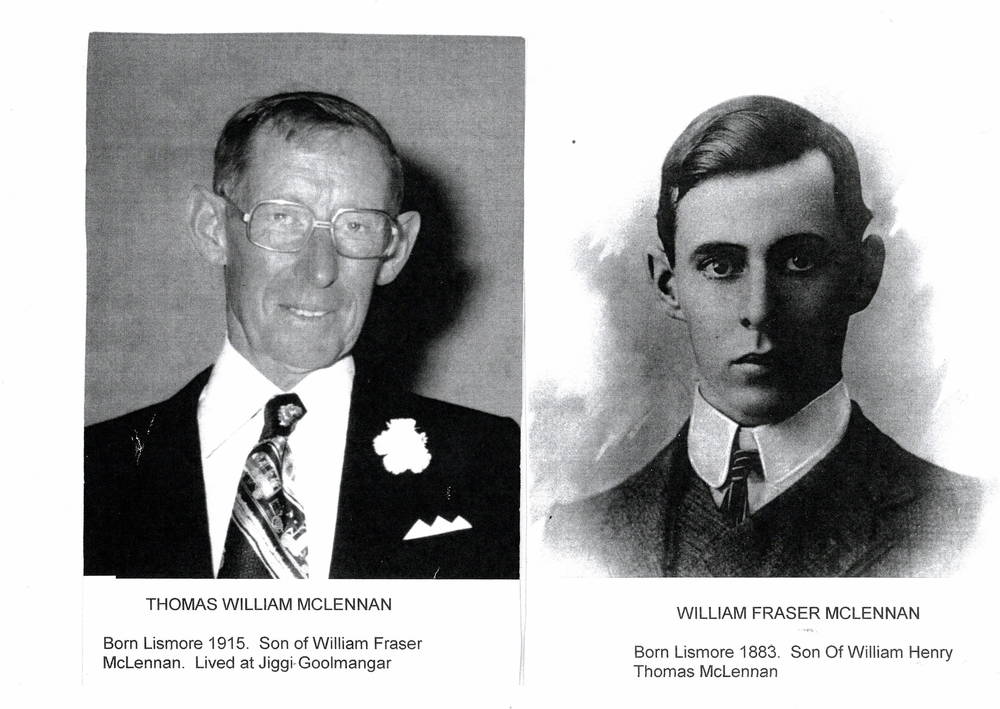
It was mainly vegetable farming as William had a bent for horticulture while Reg was more mechanically minded so when he came home from the war he was installing milking machines which were relatively new in those days. In those days dairy farming was the macadamia industry of the time, it was the boom industry.
Anyone who could run 60 head of cows could make enough money to raise a family. They became known as economic rut subsistence farmers, it was very hard to break out of that subsistence farming.
Tom went through the depression in 1927 after having lost his father at the age of 7 in a freak journey accident. He was crossing a flooded creek on his horse to get the midwife for Jean, his brothers wife when his horse stumbled and went down, he drowned.
Rebecca was now a single parent with four kids to care for. Luckily a little farm came up for sale opposite, on Jiggi Road, opposite where the Jiggi Hall is now and with the assistance of Rebecca's parents she was able to buy this property and resettle her family there. The old house had to be repaired and the dairy and piggery had to be built.
Twelve months later Tom McLennan married Phyllis Smith from Nimbin. They moved onto a leased property at Warby Road, just across the paddock from his mother where he started dairy farming. This is where Beth and I were born.
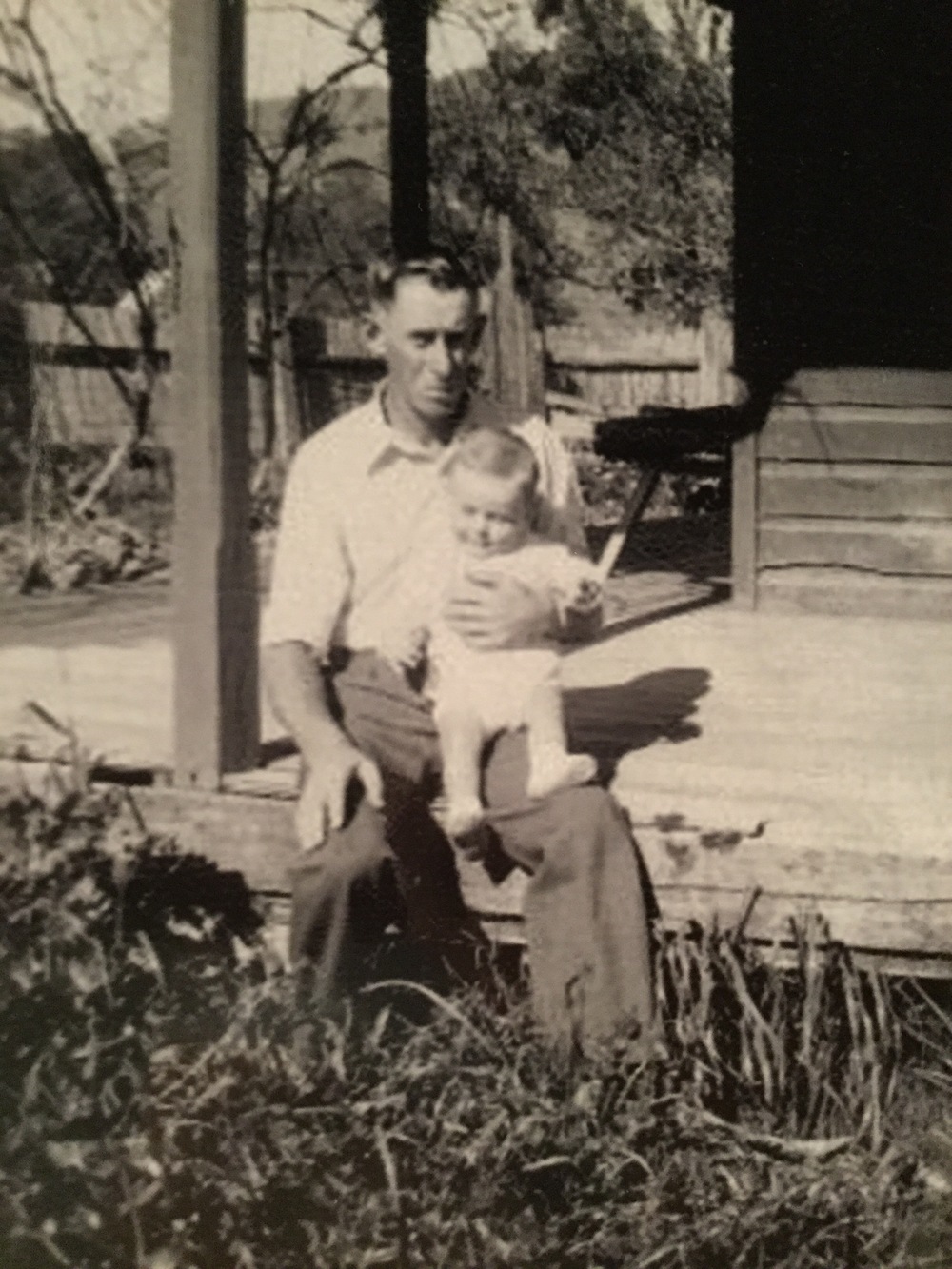
(Robert on the knee of his father, Thomas McLennan, age six months)
We lived the struggle of the leasehold farmer, it was difficult way to make a living.
When I became a teenager, I found other jobs then back to the farm and was able to buy a herd of cows and took on the farm as a Dairy farmer. I did this for a period of time and bought some land but as the family gained economic strength we bought other land and was able to become a landholder then. Tom planted a batch of banana's at Goolmangar that later put the family on its feet due to three years of high banana prices.
The 1974 cattle price crash nearly sent me broke, we had a lot of debt. I took a cynical view of the lack of concern for farmers, we were considered to be the peasants of the population and I used to say to my wife that we really are no better off than the highlanders in New Guinea. We used to sell a few calves, get our money, buy some groceries in town and go home again. We would survive until we got our monthly cream cheque from Norco, subsistence farming.
Time for a change
I loved farming and did all my courses on rural technology and so forth, I was a farmer through and through but I decided I needed to change. My wife got cancer around the same time so this made the decision easier. It was 1976 and we had two young kids so I took the view that I couldn't continue to run a big dairy herd because your wife was part of your team. She came from a farm too and knew that you both had to put your shoulder to the wheel to make it successful.
Janice had treatment in Sydney so was up and down for about two years including major operations but she survived. It's been a rocky road but we came through it.
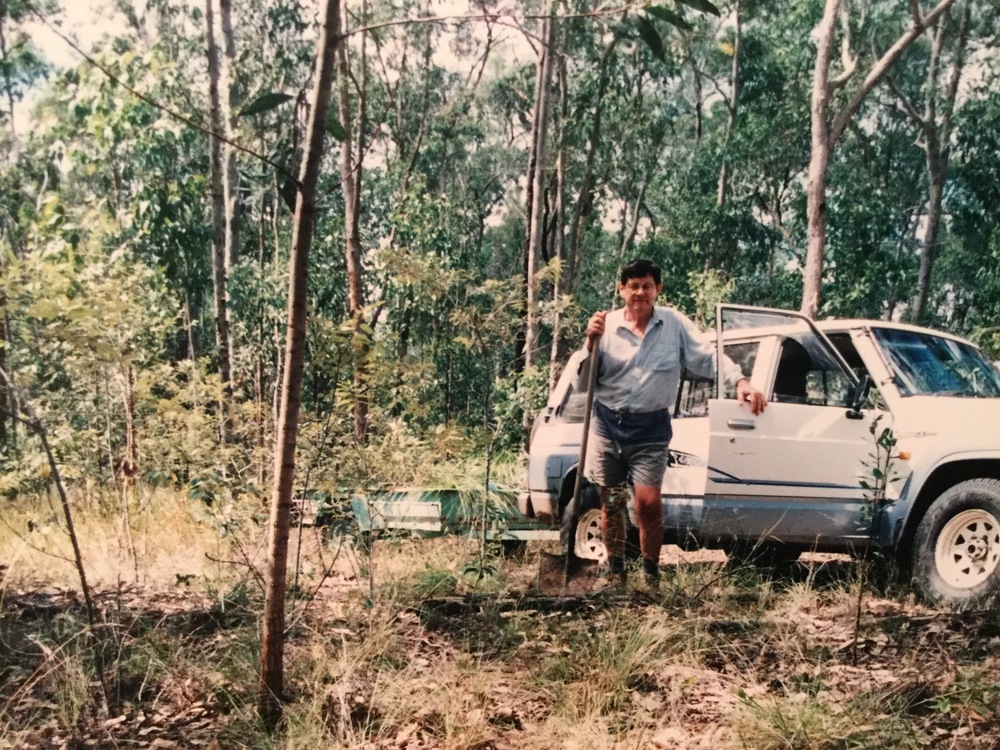
(Robert on the farm in 2000)
During that time we kept the farm but sold some land and moved to Lismore. Grant and Paulette moved from Blakebrook to Lismore Public School and I started work at a real estate office. I started the real estate course while I was on the farm in preparation to change my direction because I couldn't see any future in bringing the kids up in that environment and in that enterprise and thought that if we stay there they won't know any better either.
My father never forgave me for turning my back on farming, he was really bitter about it because he was a fourth generation farmer.
So, I worked for a Lismore Real Estate agent for a couple of years, obtained my license through TAFE, then started off my own in Goonellabah in 1982. Janice and I were the team again, we started with a phone and two listings. A lot of twelve hour days for the next fourteen years followed including working Saturday's and Sunday's to get some extra business.
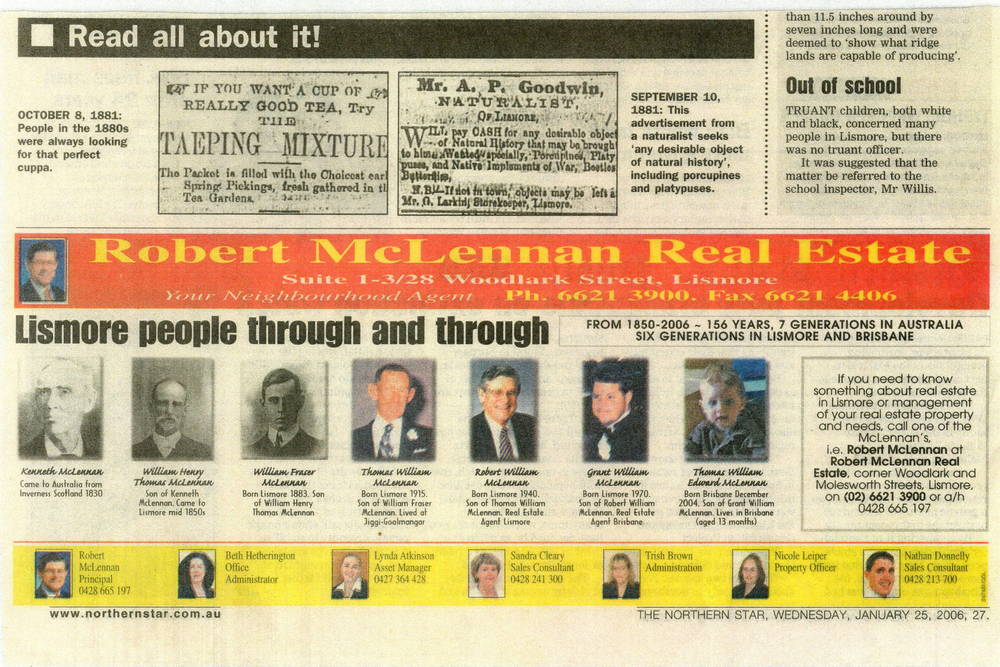
My driving to provide for the family came from my mother-in-law. We were sitting at the kitchen table soon after we got back from out honeymoon without a cent in our bank account, when she asked if we had some money coming in. I was working for my Dad at that time and I said the calves were on the ground now and we can start to sell them in three weeks and that's enough to buy groceries so it was just the three weeks we had to get by. Minnie said "do you have any prospect of some money coming in"?, I said yeah when we get going after three weeks we'll be pretty right. She said "always remember Bob, when money stops coming in the door, love goes out the window". I've never forgotten that.
Bob turns 80 this year so I asked "how long will you keep going on"?
You have to plan for the inevitable but you have to also keep an open mind as to how long that might be. My view is that you are better to wear out than sit around waiting to die. I firmly believe you have to have goals and I see this as just another goal and inside I don't feel any different to what I did when I was 60. I'm just finding it a bit harder to get out of bed in the morning but I try and keep healthy and stay active, that's the secret of it you know.
We've had a lot of challenges in our life and you learn not to get too excited when you are in the middle of a muddy stream, you have to believe that you will get to the other side.
Bob and his family have a long involvement in Lismore and surrounds so the obvious question was "how can we get Lismore back to having a positive sentiment"?
I addressed the Rotary Club in the year 2000 "Where to from now?" and I gave an hour long speech on that. To break it down into small pieces basically you have to have economic growth to have social growth and to have prosperity in a town. You have to have an economic engine and I could see the end of the dairy farming era that drove me off the land.
In the late 1970's farmers were providing cheap food so the rest of the economy could prosper. The discretionary spending was good so people can spend money on white goods. Back then the owners of the businesses lived in town so the profits were invested back into our economy. Now, the money is getting sucked out of the town by the corporate entities like Woolworths and Coles. In the early days in town you had McLeans, Jeanettes and the other little family shops where the money stayed in the town, millions of dollars. All of a sudden, if you see Lismore as a bucket, someone has drilled little holes in the bottom then the sides so when you fill up that bucket all the water runs out and goes elsewhere.
It is more difficult for the small business owner now. Once they pay rent, wages and tax they barely have enough left over to buy groceries. They throw their hands up and say well if I am going to work for nothing I might as well go and sit on the beach and work for nothing. So, if you remove incentive out of society you reduce the drive. The economic driver that they had before has gone and we need an economic driver in any community.
FOR SALE/OPEN HOMES